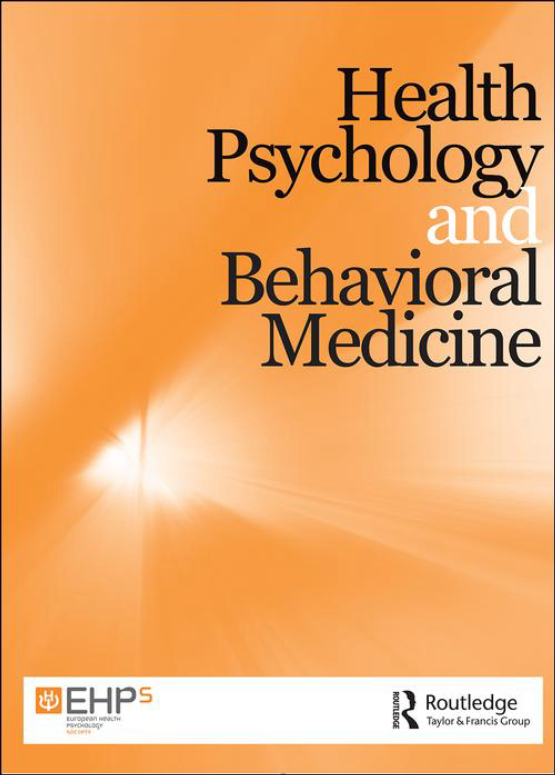Submit a Manuscript to the Journal
Health Psychology and Behavioral Medicine
For an Article Collection on
Health Consequences of Stigma
Manuscript deadline


Article collection guest advisor(s)
Dr. Natasha Fothergill-Misbah,
Newcastle University, UK
Tash.fothergill-misbah@ncl.ac.uk
Dr. Mary A. Bitta,
Aga Khan University, Kenya and Harvard University, USA
Marybittah@gmail.com
Dr. Petra Gronholm,
London School of Hygiene and Tropical Medicine, UK
petra.gronholm@lshtm.ac.uk
Health Consequences of Stigma
Stigma is a powerful social determinant of health, shaping both physical and mental health outcomes. Across a range of conditions, identities, and social contexts—whether related to mental health, non-communicable and infectious diseases, weight, disability, race, gender, sexuality, or other marginalized characteristics—stigma not only limits access to healthcare but also drives biological stress responses, exacerbates chronic conditions, and worsens psychological well-being. The health consequences of stigma are wide-ranging, from increased inflammation and cardiovascular risks to heightened anxiety, depression, and reduced accessibility of treatment. This Article Collection focuses on the tangible health outcomes of stigma across conditions, characteristics, and intersections, emphasizing the need for a deeper understanding of its physiological, psychological, and behavioral pathways. By examining how stigma manifests in different populations and healthcare systems and evaluating interventions that mitigate its impact, this Collection seeks to advance solutions that improve health equity and overall well-being.
Stigma is not just a social challenge—it is a fundamental human rights issue with serious consequences for health, well-being, and social equity at a global scale. It undermines the right to health by creating barriers to healthcare access, including access to treatment, and increasing psychological distress. Stigma also perpetuates disadvantage, deepening the burden of poverty, disability, gender inequality, ageism, and other forms of marginalization. By limiting life opportunities—whether in education, employment, or social participation—stigma reduces quality of life and entrenches systemic inequities. Addressing stigma is essential to achieving the Sustainable Development Goals (SDGs), particularly those related to health, equality, and social inclusion. Tackling stigma is not only a moral imperative but a necessary step toward building healthier, more just societies.
This Article Collection invites original research, reviews, methodological papers, and perspective pieces that examine diverse health outcomes of stigma across different populations and healthcare settings globally. We welcome contributions that explore the experiences, mechanisms, and impacts of stigma on health outcomes, for example, the psychological mechanisms linking stigma to disease progression, the psychological and behavioral consequences of stigma, and influences on health disparities. Studies addressing intersectional stigma, structural stigma in healthcare systems, and community level interventions to mitigate stigma-related harm are particularly encouraged. Submissions may focus on a range of health conditions including but not limited to mental illness, infectious disease, obesity, disability, and other stigmatized identities. We especially welcome research that is co-produced with people with lived experience and encourage perspective pieces from individuals directly affected by stigma. Interdisciplinary approaches integrating insights from public health, medicine, psychology, arts, and social sciences that consider the intersectional nature of stigma influences are also of interest.
Please contact Dr. MK Huffman at mary.huffman@taylorandfrancis.com with any queries and discount codes regarding this Article Collection.
Dr. Natasha Fothergill-Misbah is a postdoctoral research associate in the Population Health Sciences Institute at Newcastle University. Her research focuses on older people and Parkinson’s disease in Africa and uses qualitative methods, including ethnography, to address the social, physical, and economic factors that influence health and access to health and social care across the life course. Natasha leads on a grant to develop an arts-based community awareness campaign, co-created with people with lived experience, to reduce the stigma of neurological disorders in rural coastal Kenya. In addition to her research, Natasha consults for the World Health Organization on the development and implementation of global policy on brain health linked to the intersectoral global action plan on epilepsy and other neurological disorders.
Dr. Mary A. Bitta is a postdoctoral fellow at Harvard Medical School’s Department of Global Health and Social Medicine and the Brain and Mind Institute at Aga Khan University. Her research focuses on stigma and health, with a particular emphasis on mental, neurological, and substance use disorders in low-resource settings. She has led studies on stigma reduction interventions and community-based mental health approaches in rural Kenya. Mary is also an honorary fellow at the University of Oxford’s Department of Psychiatry and a member of the Mental Health Council in Kilifi County, Kenya, where she advises on research and innovation. Her work aims to advance evidence-based strategies that promote health equity and improve the well-being of marginalized populations.
Dr. Petra Gronholm is an Assistant Professor at the Centre for Global Mental Health, Department of Population Health. Petra holds core expertise in mental health research and health services research, considering questions around help-seeking and service access, including exploring barriers and facilitators of service access considering the role of mental health stigma and discrimination. Much of Petra's current work explores these phenomena in a global mental health context. Petra's work takes an applied health services research perspective, bridging theory and practice, with the aim to drive practical change through contributing to the development of guidelines and toolkits, including in collaboration with international health agencies like WHO.
Dr. Fothergill-Misbah, Dr. Bitta, and Dr. Gronholm declare no conflicts of interest regarding this work.
Benefits of publishing open access within Taylor & Francis
Global marketing and publicity, ensuring your research reaches the people you want it to.
Article Collections bring together the latest research on hot topics from influential researchers across the globe.
Rigorous peer review for every open access article.
Rapid online publication allowing you to share your work quickly.
Submission Instructions
All manuscripts submitted to this Article Collection will undergo desk assessment and peer-review as part of our standard editorial process. Guest Advisors for this collection will not be involved in peer-reviewing manuscripts unless they are an existing member of the Editorial Board. Please review the journal Aims and Scope and author submission instructions prior to submitting a manuscript.
